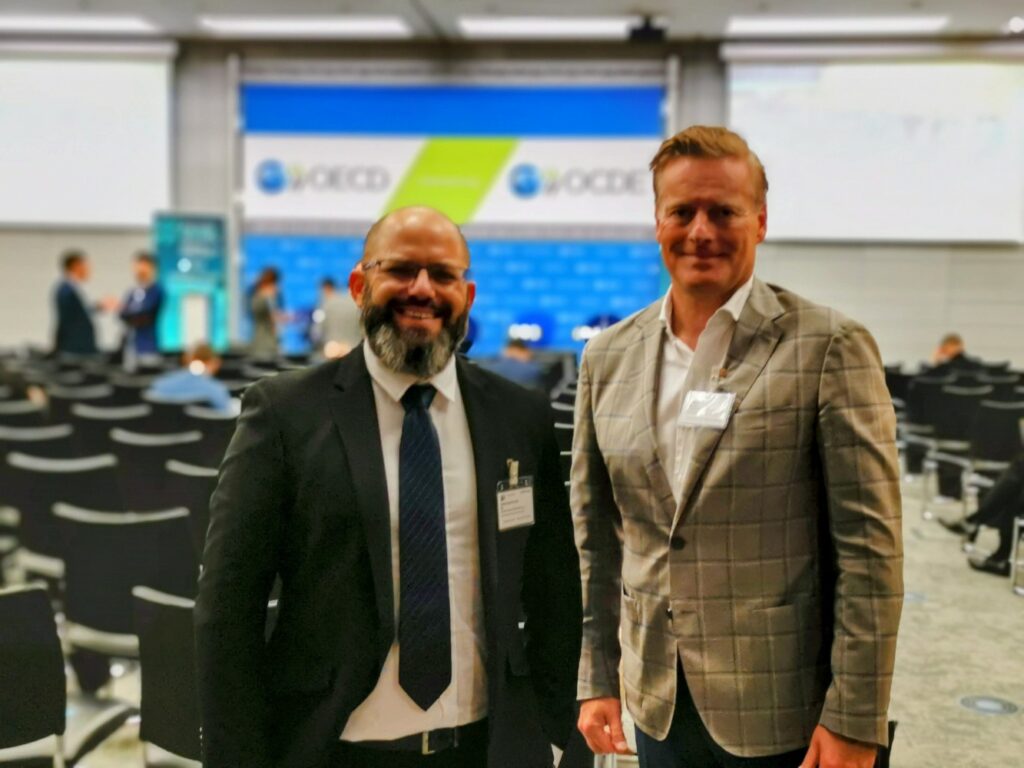After nearly two years of virtual meetings, the OECD finally held an in-person event again for its fifth iteration of the annual Global Blockchain Policy Forum on September 28th-29th. EBA chairman Dr. Michael Gebert shares his take on the discussions, challenges, and possible solutions and looks back at an inspiring event with a diverse mixture of policymakers, innovators, and thought leaders.
Similar to the early days of the Internet, blockchain technology is already challenging the effectiveness and applicability of legal restrictions. In contrast to the Internet, which has evolved into an increasingly centralized system that has been largely brought within the reach of the law, blockchain technology continues to resist regulation and is therefore described by some as being “alegal,” i.e., situated beyond the boundaries of existing legal orders and therefore challenging them.
The world’s first government-endorsed policy standard on blockchain technology
Under the joint directive Fit for the future: supporting responsible and trustworthy innovation the common ground for discussion was the development of strategies, procedures, and frameworks that will direct blockchain development in the direction of innovation—both responsible and trustworthy as a priority for governments and an absolute necessity for businesses. During the course of the forum, those goals were identified as a crucial requirement for the widespread application of blockchain technology in the future.

Additionally, the launch of the OECD Recommendation on Blockchain and Other DLT was presented to a wider audience. Which was the world’s first government-endorsed policy standard on blockchain technology.

A task at hand: closing the gaps in global cooperation and coordination
Some of the most significant shifts in finance that are taking place right now are being driven by blockchain-based financial innovations such as crypto-assets, decentralized finance, and others. Such innovations present significant opportunities to improve the efficiency and efficacy of financial systems. However, the myriad risks cut across major domestic and international regulatory and supervisory mandates and the rules used to deliver on them. Such innovations also present significant opportunities to improve the effectiveness of financial systems.
These events are happening all across the world, and the problems that have been brought up are intricately tied to one another. Nonetheless, the policy answers that have been offered thus far risk causing fragmentation between nations and among international agencies. The high-level debates brought together leaders in financial policy to discuss the gaps in our present approaches to global cooperation and coordination, as well as the consequences these approaches have for the laws and institutions that underpin them.
Decentralized technologies are emerging as a significant aspect of the next evolution of the digital economy, as well as the foundation upon which many advantageous new products, services, and markets could be built, including new forms of finance, novel governance models, and means of social connection. Simultaneously, successive waves of blockchain innovation have revealed the necessity to adequately reflect the legal rights and duties of participants in these networks, the activities they support, and the emerging governance structures. Due to the absence of geographical boundaries in decentralized systems and the global character of digital markets in general, international cooperation has become essential.


Great exchange on EDU DAO Initiatives with the Israeli Blockchain Association
The benefits of regualtory sandboxes
The advantage of relying on regulatory sandboxes is that they allow regulators and policymakers to delegate the task of coming up with innovative solutions concerning the regulation of blockchain technology to the actors who are directly involved in the use of that technology. This frees up regulators and policymakers to focus on other tasks (and have a better understanding of their respective challenges and opportunities). If policymakers were to recognize blockchain-based solutions as either functionally or regulatorily equivalent to the purpose of existing legal provisions over time, the granting of regulatory exemptions could be implemented outside of the regulatory sandbox, thereby reducing the burden of legal and regulatory compliance for all of these actors who would integrate these solutions into their own information systems.
This would be the case if policymakers were to recognize blockchain-based solutions as either functionally or regulatorily equivalent to the purpose of existing legal provisions. If it were to be successful, this strategy would make it possible for novel blockchain-based solutions to be developed that voluntarily comply with existing policies and regulations. This would allow these solutions to gain the benefits of regulatory exemptions without unduly compromising the decentralized nature of the systems in question.

Instead of undertaking extensive legal reforms to regulate blockchain-based systems in an all-encompassing manner, which might require either a radical reformulation of the legal order or an actual modification of the underlying infrastructure and political structure of these systems, we propose that policies leverage the notions of functional equivalence and regulatory equivalence as an alternative means of bringing these systems within the scope of the legal order. This would avoid the need for either a radical reformulation of the legal order or an actual modification of the infrastructure and politics.
One of the most pressing regulatory problems about blockchain is whether or not the technology can conform to national and international privacy regulations. The answer to this question will determine how blockchain is utilized and adopted in the future. The immutability of data and the decentralization of data processing raise issues in both public and private networks. These issues arise because existing privacy policy fundamentals and regulatory models, which are frequently entity-based, may be violated if personal information is collected and stored in a manner that is incompatible with them.
At the same time, there is the possibility of utilizing this technology in such a way as to improve one’s level of privacy, provided that the applicable legal frameworks so permit.

